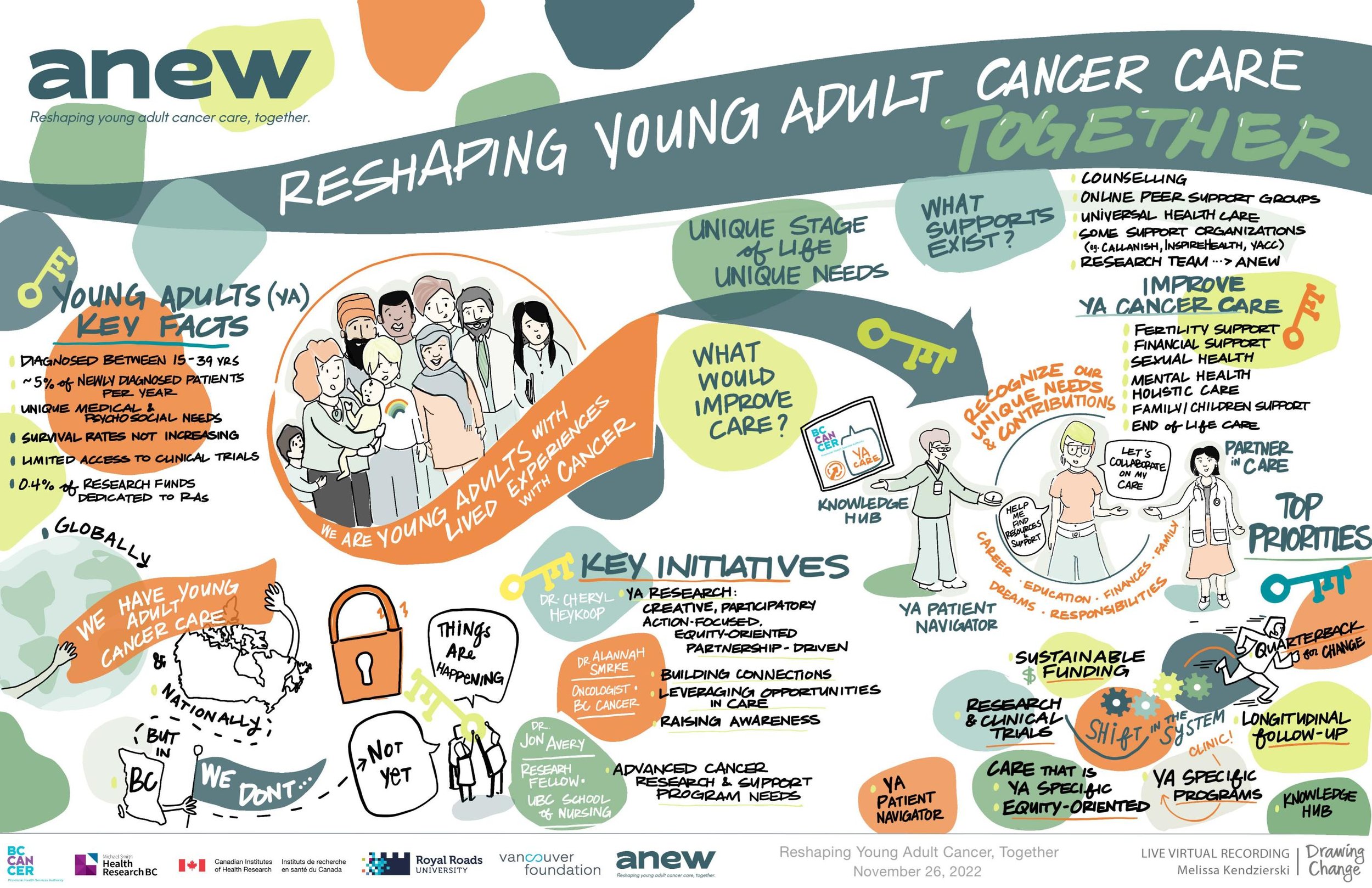Reshaping Young Adult Cancer Care Through Meaningful Engagement with Young Adults & Cancer Care Allies
Reshaping Young Adult Cancer Care Through Meaningful
Engagement with Young Adults & Cancer Care Allies
In Canada, over 9.200 young adults, age 15-39 are diagnosed with cancer each year, and cancer care systems have limited capacity to meet the complex and unique needs of young adults.
Working in collaboration with young adults with lived experience of cancer and those who care for them (often referred to by us as cancer care allies – clinicians, care providers, families, researchers, and community organizations) we are working to reshape young adult cancer care in BC, and beyond.
“As a young adult, being diagnosed with cancer is very, very lonely. I just wanted to find someone I could talk with who was also young and had cancer.”
-Young adult with lived experience with cancer.
Using creative, patient-centred, and participatory methods we are working to: 1) share lived experiences of young adults with cancer, 2) identify key needs and priorities of young adults, 3) envision innovative and responsive young adult cancer care, 4) pilot actions to improve young adult cancer care, 5) build capacity in patient-centred, participatory research, and 6) inspire changes in young adult cancer care research, policy, and practice.
Reshaping Young Adult Cancer Care in BC
In BC, we are working closely with young adults with lived experience with cancer, BC Cancer, BC Children’s Hospital, and community partners to develop and implement a young adult cancer care program in BC.
In November 2022, we co-facilitated a session at the BC Cancer Summit with 70+ young adults with lived experience of cancer, clinicians, and related care providers to share insights and prioritize actions for change going forward. This gathering sparked the development of our roadmap for change.
Then, in November 2023, we co-led another session sharing progress and delving into the priorities of counselling services for young adults with cancer, better access to fertility care and resources and overall supports sought by young adults. Almost 100 people took part in this session including 30 young adults with lived experience of cancer together with clinicians and related care providers.
November 2024 Summit included a prominent focus on young adult cancer care with Anew co-facilitating sessions on the opportunity to develop a counselling program for newly diagnosed young adults and to review and enhance a fertility care pathway and accompanying resources co-designed with young adults and care providers. Both these sessions were at-capacity with 80+ young adults and care providers participating in each.
In collaboration with our partners, we are working to:
Better understand the lived experiences and priorities of young adults with cancer and cancer care allies in BC
Co-develop resources for young adults and care providers
Co-design and implement a young adult cancer program
Strengthen patient navigation and support
Improve cancer related fertility policies and practices
Build knowledge and capacity of young adults and care providers
Improving Care in BC and Beyond
Nationally, we are working closely with Young Adult Cancer Canada to integrate patient-oriented, participatory methods into programming and research. We are participating in the Adolescent and Young Adult Priority Setting Partnership to identify research priorities focused on young adults with lived/living experiences with cancer, and we co-edited a special issue of Current Oncology focused on young adult partnerships and collaborations to facilitate change in young adult cancer care.
Momentum and enthusiasm are building to better understand the complexities of young adult cancer care and there is a collective desire and commitment to reshape young adult cancer care, together.
Research partners: young adults, Royal Roads University, BC Cancer, BC Ministry of Health, BC Cancer Research, Young Adult Cancer Canada, BC SUPPORT Unit, Callanish Society, InspireHealth, the Innovation Support Unit at the University of British Columbia’s Department of Family Practice, BC Children’s Hospital, AYA CAN, AYA Priority Setting Partnership.
This research is supported with funding from Royal Roads University, the Vancouver Foundation and Michael Smith Health Research BC.






